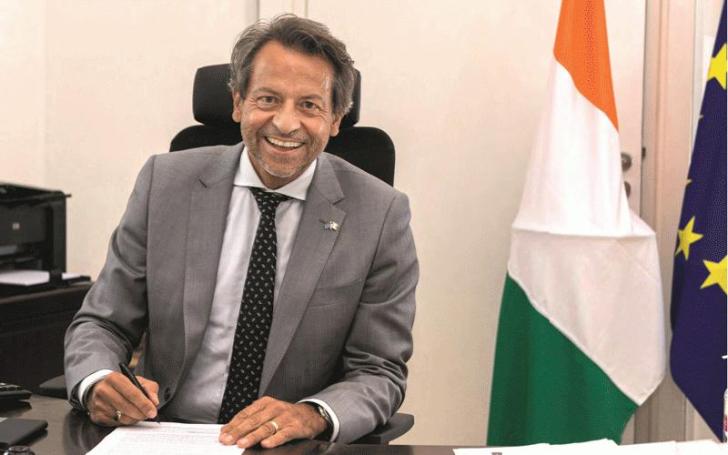News / National
EU scraps duty on Zimbabwe exports
28 Apr 2025 at 11:12hrs |
4 Views

In a landmark development for Zimbabwe's trade ambitions, European Union Ambassador to Zimbabwe, Jobst Von Kirchmann, announced that Zimbabwean companies can now export any product to the EU duty-free.
Speaking at the Zimbabwe International Trade Fair (ZITF) in Bulawayo last week, Ambassador Von Kirchmann outlined the significant opportunity this presents for local businesses, especially amid growing global concerns over trade barriers following new tariffs recently imposed by U.S. President Donald Trump.
"We have been participating in ZITF for the last two or three years, which signifies our long-standing and reliable commitment to the Zimbabwean people," said Ambassador Von Kirchmann. "Amid global discussions on trade barriers, we are proud to say that any Zimbabwean company can export any product to the EU without tariffs or duties."
While EU imports into Zimbabwe may still attract certain duties, the ambassador emphasized that Zimbabwean exporters now enjoy unparalleled access to the vast European market. This initiative is expected to provide a major boost for local producers seeking to expand internationally.
Ambassador Von Kirchmann also revealed that European foreign direct investment (FDI) in Zimbabwe has tripled in recent years, with over €500 million currently directed towards sustainable agriculture and women's empowerment initiatives. These projects include providing drought-resistant crops to farmers and improving livelihoods in vulnerable communities.
Despite the favourable conditions, Von Kirchmann acknowledged a persistent trade imbalance that actually benefits Zimbabwe. "Zimbabwe is exporting more to the EU than importing, and we are fine with that," he said.
Horticultural products dominate Zimbabwe's exports to the EU, with the bloc buying over 40 percent of the country's horticultural output. Annual trade between Zimbabwe and the EU now exceeds €700 million, positioning the EU as Zimbabwe's fourth-largest trading partner.
One major challenge, according to the ambassador, is the lack of awareness among Zimbabwean businesses about the duty-free export opportunity. "Every time I speak to companies, I find many are unaware that they can export to the EU duty-free. I hope that through media outreach, more companies will learn about this fantastic opportunity," he said.
In a bid to further support Zimbabwe's private sector, the EU has also launched a €60 million lending facility through the European Investment Bank. The initiative offers long-term, low-interest loans to local businesses, aiming to stimulate industrialization and job creation.
Looking ahead, the inaugural EU-Zimbabwe Business Forum will take place in Harare from May 20 to 22. The forum seeks to foster partnerships and joint ventures between European and Zimbabwean companies, with a focus on key sectors such as agriculture, horticulture, agro-processing, renewable energy, and mining beneficiation.
"We have identified value chains where Zimbabwe has a genuine interest and where Europe also sees potential," said Ambassador Von Kirchmann, citing specific opportunities in berries, citrus, macadamia nuts, and renewable energy.
The duty-free access initiative and the upcoming business forum mark a major step forward in strengthening economic ties between Zimbabwe and the European Union.
Speaking at the Zimbabwe International Trade Fair (ZITF) in Bulawayo last week, Ambassador Von Kirchmann outlined the significant opportunity this presents for local businesses, especially amid growing global concerns over trade barriers following new tariffs recently imposed by U.S. President Donald Trump.
"We have been participating in ZITF for the last two or three years, which signifies our long-standing and reliable commitment to the Zimbabwean people," said Ambassador Von Kirchmann. "Amid global discussions on trade barriers, we are proud to say that any Zimbabwean company can export any product to the EU without tariffs or duties."
While EU imports into Zimbabwe may still attract certain duties, the ambassador emphasized that Zimbabwean exporters now enjoy unparalleled access to the vast European market. This initiative is expected to provide a major boost for local producers seeking to expand internationally.
Ambassador Von Kirchmann also revealed that European foreign direct investment (FDI) in Zimbabwe has tripled in recent years, with over €500 million currently directed towards sustainable agriculture and women's empowerment initiatives. These projects include providing drought-resistant crops to farmers and improving livelihoods in vulnerable communities.
Despite the favourable conditions, Von Kirchmann acknowledged a persistent trade imbalance that actually benefits Zimbabwe. "Zimbabwe is exporting more to the EU than importing, and we are fine with that," he said.
Horticultural products dominate Zimbabwe's exports to the EU, with the bloc buying over 40 percent of the country's horticultural output. Annual trade between Zimbabwe and the EU now exceeds €700 million, positioning the EU as Zimbabwe's fourth-largest trading partner.
One major challenge, according to the ambassador, is the lack of awareness among Zimbabwean businesses about the duty-free export opportunity. "Every time I speak to companies, I find many are unaware that they can export to the EU duty-free. I hope that through media outreach, more companies will learn about this fantastic opportunity," he said.
In a bid to further support Zimbabwe's private sector, the EU has also launched a €60 million lending facility through the European Investment Bank. The initiative offers long-term, low-interest loans to local businesses, aiming to stimulate industrialization and job creation.
Looking ahead, the inaugural EU-Zimbabwe Business Forum will take place in Harare from May 20 to 22. The forum seeks to foster partnerships and joint ventures between European and Zimbabwean companies, with a focus on key sectors such as agriculture, horticulture, agro-processing, renewable energy, and mining beneficiation.
"We have identified value chains where Zimbabwe has a genuine interest and where Europe also sees potential," said Ambassador Von Kirchmann, citing specific opportunities in berries, citrus, macadamia nuts, and renewable energy.
The duty-free access initiative and the upcoming business forum mark a major step forward in strengthening economic ties between Zimbabwe and the European Union.
Source - The Herald
Join the discussion
Loading comments…





















